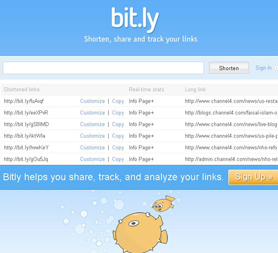Libyan protests driven by ‘.ly’ websites
URL-shortening websites registered in Libya have proved to be the biggest tool for Libyan protesters to spread videos and images across the world from the isolated country.

You may or may not know that the growing trend over the last few years to use the .ly suffix on internet domain names actually means that the website is registered in Libya.
Mainly used for “shortening” websites that enable abridged links to be added to tweets, .ly pages have been used by protesters across North Africa and the Middle East to spread videos and pictures through shortened web addresses embedded into Twitter feeds.
The political irony of the location of the domain company is that it is websites such as bit.ly that have enabled people within Libya to spread information via Twitter in the face of the general ban on international media in the country.
Internet shutdown
The Libyan government has attempted to stop information coming out of the country by shutting down the internet. The political irony of the matter is that websites across the world have helped to disseminate the videos, eye-witness accounts and photos across the internet instantly through Twitter.
Probably the most famous of all the websites, bit.ly, is based in New York and paid only $75 for the domain name in 2007, choosing the name not because of any links with Libya but because: “It’s short and it is evocative of small bits, loosely coupled”.
Despite the internet shut-down it has been impossible for Libya to close down this succesful tool used by a number of protesters. Bit.ly uses five different “root servers” with only two based in the African state. For the website to be shut down it would need all five servers to simultaneously stop working. With two in Oregon, USA and one in the Netherlands, it will remain virtually impossible for Libya to stop videos being sent via the website.
It is however a problem that had occured to Libyan authorities. As of June 2010 all .ly domains shorter than four characters could be registered only by Libyan companies and individuals. One website, vb.ly, was closed down because of its adult content, but it appears that the fact bit.ly has international based servers has meant that similar action has not been possible.
Follow the developments from Libya on the Channel 4 News Live Blog
-
Latest news
-
As India goes to the polls in the world’s largest election – what do British-Indians think?6m

-
Tees Valley: Meet the candidates in one of the biggest contests coming up in May’s local elections4m

-
Keir Starmer says public sector reform will be a struggle7m

-
Nicola Sturgeon’s husband Peter Murrell charged with embezzlement of funds from SNP1m

-
Ukraine might finally get $60billion in American weapons and assistance to defend against Russia3m

-




